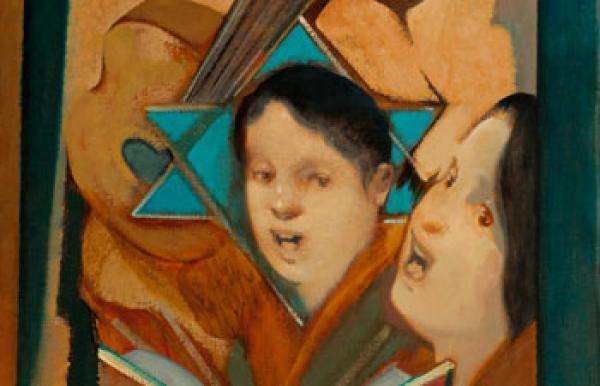Volume 20: L'DOR VADOR

January 07, 2014
PDF Download
A singing of angels.
That's the title of one of two works by composer Charles Davidson that you'll find in Volume 20 from the Milken Archive of Jewish Music: The American Experience. And it's also an apt description of what you'll encounter throughout this collection of pieces featuring the voices of children.
The sound of children's voices has been a part of Jewish music for millennia. Young boys sang in the choruses of the ancient Temple in Jerusalem, and in the synagogue choirs that flourished in both Europe and America in the 19th and 20th centuries; while medieval European cantors so prized the boy sopranos who accompanied them that it wasn't uncommon for one hazzan to poach a singerl, or "little singer," from another. Children's choirs also played prominent roles in the Yiddish folksong and modern Zionist movements, giving voice to a plethora of songs in both Yiddish and Hebrew.
The American Jewish composers featured in Volume 20 draw freely from these traditions, just as they take full advantage of the unique quality inherent to youthful voices. Such voices are, in effect, the secret weapon that Israeli-born composer (and former boy chorister) Abraham Kaplan used to sculpt a highly variegated series of arrangements for his "Psalms of Abraham," a cantata comprising 12 settings of 11 different psalms. Kaplan allowed the moods of the psalms themselves to dictate the orchestration and texture of each movement, and it would appear that those moods changed frequently: In Al Naharot Bavel, hushed passages for alternating choruses of boys and men—specifically, the esteemed Vienna Boys Choir and its alumni organization, the Chorus Viennensis—give way to livelier ones dominated by children's voices and piping winds; while in Hodu Ladonai, the composer introduces a cantorial tenor whose forceful declamations stand in sharp contrast to the ethereal children's voices that surround him. (The same juxtaposition of male tenor and children's chorus also enriches Issachar Miron's "Psalms of Israel.") By the time we hit the rhythmically trippy Hal'Luya, a xylophone and a trumpet imitating a ram's horn have joined the party—and we're barely halfway toward the finish line.
Kaplan's mentor, the great French-American Jewish composer Darius Milhaud, takes listeners on a journey through similarly changeable musical terrain in "Cantata from Proverbs," which moves from the relatively dark "Who Crieth Woe" into an increasingly joyous landscape of lustrous vocal harmonies and tumbling, dancelike figures. And there is just as much internal variety to Davidson's "A Singing of Angels," a suite based entirely on Yiddish folksongs, authentic and otherwise—their translated lyrics delivered by Finchley Children's Music Group, England's answer to the Viennese. Here we find everything from "Dance with Me," an anonymous folksong equipped with a halting klezmer rhythm and a distinctively Eastern European melody, to "The Merry Rebbe Elie," which draws on a satirical tune that folksong collectors assumed was European in origin but was actually written in America during the early 20th century.
The musical language of "A Singing of Angels"—not to mention that of Davidson's "Baroque Suite," which puts a bunch of three-hundred-year old dances, some medieval Hebrew poetry, and an entire children's chorus in a blender and serves them up with a side of harpsichord and flute— is worlds away from what you'll find in Paul Dessau's "Song of Songs." Dessau, who composed numerous works for film, theater, and the concert stage, was born in Hamburg and died in communist East Berlin; lived for a while in Paris, New York, and Los Angeles; and traversed a musical path that led from German romanticism to the outer fringes of the avant garde. In his "Song of Songs," boys' and girls' voices seem to spin silken webs of sound that twist and warp without ever losing their shape. The melodies are exquisite, the dissonances piquant, and the textures, which are at first clear and spacious, gradually thicken into a fugal scrum of surging, ascending lines.
For sheer emotional intensity, "Song of Songs" is matched only by Israeli-American composer Ofer Ben-Amots' "Psalm 81." Ben-Amots draws much inspiration from the text itself—he reproduces its parallelism by splitting the choir into two parts, uses quickly shifting rhythms to accentuate the irregular patterns of the ancient Hebrew, and employs percussion to echo the timbrel, an ancient Israelite tambourine that is mentioned in the psalm—but the emotional rollercoaster ride that ensues is entirely of his own devising. The piece begins with rumbling tympani and the sound of children's voices gliding over one another in great blocks; the tension gathers as the connection between smooth choral surfaces and irregular rhythms is stretched almost to the breaking point; there's a brief, soaring, solo interlude; and then we're off again, thrown into another choral whirlwind in a pattern of tension and release that will repeat many times before the piece is over.
It's a performance that calls to mind a comment by the Milken Archive's artistic director, Neil W. Levin: this is music for children's voices, but not principally for children's ears. Indeed, the volume's Hebrew title, L'Dor Vador—"from generation to generation"—could be taken as a sly reference to that observation. For while we tend to think of gifts being passed from one generation to the next, the inverse appears to apply here, as music sung by the youngest of singers yields art that is best appreciated by more mature audiences.
